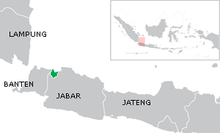LIPIA
| LIPIA معهد العلوم الإسلامية والعربية في إندونيسيا | |
|---|---|
 Location of LIPIA | |
|
Latin: The Institute of Islamic and Arabic Sciences in Indonesia  LIPIA Location of LIPIA in Jakarta | |
| Founder(s) | Imam Muhammad ibn Saud Islamic University, Riyadh |
| Established | 1980 CE |
| Focus | Education |
| Owner | Saudi Arabia |
| Location | Jalan Buncit Raya No.5A |
| Website | http://www.lipia.org |
LIPIA (Arabic: معهد العلوم الإسلامية والعربية في إندونيسيا, translit.: Ma'had al-ʻulumi al-Islamiyyah wal 'arabiyah fi Indunisia; Indonesian: Lembaga Ilmu Pengetahuan Islam dan Bahasa Arab; English: Islamic and Arabic College of Indonesia) is an educational institution established in Jakarta. The college is a branch of the Imam Muhammad ibn Saud Islamic University in Riyadh, Saudi Arabia. The main purpose is to teach Arabic and Islam.
History
The College was founded in 1980 to provide education with concentrations in Arabic and Islamic religion for Indonesian students with approval from the Royal Court, No. 5/n/26710. The name of the college was Arabic Teaching Institute ("Lembaga Pendidikan Bahasa Arab") until 1986. The college gives scholarship to its top students to continue their education to Imam Muhammad ibn Saud Islamic University in Riyadh, Saudi Arabia.
The vision of the LIPIA establishment is to be the distinguished leader in creative learning, teaching and research in Islamic and Arabic sciences.
All lectures taught in LIPIA are delivered in Arabic language and about 80–90 percent of the lecturers are from Saudi Arabia. It has very high acceptance standard, where only 200 students are accepted out of 2000 applicants. Once they are admitted, they do not need to pay any tuition, even they are paid stipends. 200 students graduate from the college every year.[1]
The college teaches Wahhabi Madhab, a branch of Salafi. Every student has to learn the teachings of Ibn Taimiyah. The college is also influeced by Al-Ikhwan al-Muslimin[1] Many of its lecturers have been influenced by the Muslim brotherhood doctrine. Many of the alumni later became Salafi activists, preachers or teachers. Some of them opened other institutions based on Wahhabism and funded by Saudi Arabia.
Some figures who have studied at LIPIA are Jafar Umar Thalib and Muhammad Rizieq Shihab.
References
- ↑ 1.0 1.1 Bubalo, Anthony; Fealy, Greg (2007). Jejak Kafilah: Pengaruh Radikalisme Timur Tengah di Indonesia (in Indonesian). Mizan Pustaka. pp. 94–101. ISBN 978-9-79433-476-8.